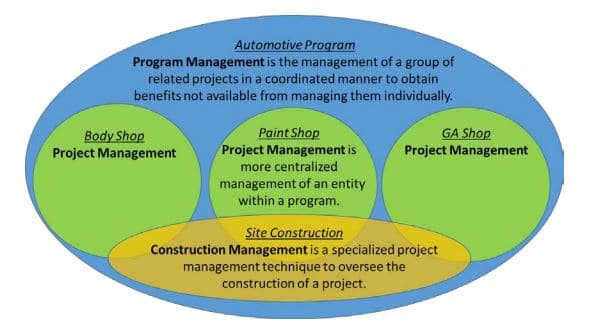Overview of Program Management and Project Management

What Is Project Management?
Project management is the process of planning, executing, and managing resources to complete a project successfully. It generally involves strategically scheduling activities, monitoring progress, managing risks, and coordinating with multiple teams and stakeholders.
Advantages
Having a project management system or utilizing a professional program management firm dedicated to project management can help you stay organized and ensure every task and milestone within your project is completed on time and within budget.
Other direct advantages of project management include:
- Improved Communication: Project management helps ensure everyone involved in a project is on the same page. This improved communication leads to better collaboration, clearer objectives, and more efficient outcomes.
- Reduced Risk: Risk is inherent in all projects, but project management can help to identify potential pitfalls in advance and create a plan for managing them.
- Increased Efficiency: Project managers are responsible for identifying waste and duplications of effort within the project. As a result, resources can be better utilized and projects completed more quickly and within budget.
- Improved Quality: An experienced project management team ensures the project at hand meets predetermined quality criteria, giving stakeholders confidence that their project is meeting the expected standard.
- Better Cost Control: With project management, businesses can also maximize resources while minimizing costs, allowing for greater control over the budget.
Program Management Versus Site Management Versus Project Management
While program management, site management, and project management may all sound similar, they each refer to different types of work and processes.
Program Management:
Program management is the management of a group of related projects in a coordinated manner to obtain benefits not available from managing them individually.
- Often involves managing multiple large-scale, technical projects (programs) within a single organization.
- Ensures coordination between projects for linking tasks and activities.
- Responsible for scheduling tasks and activities and monitoring progress.
- Develops strategies for program-level risk assessment, resource allocation, and budgeting.
- Responsible for collecting data on program performance and providing reports of progress to management.
Site Management:
Overall site program management involves a range of activities, including planning and scheduling, resource allocation, risk management, communication, and reporting. The program manager is responsible for ensuring that all of these activities are carried out effectively and efficiently to achieve the goals of the program.
The program manager must work closely with all stakeholders, including the project team, vendors, contractors, and customers, to ensure that everyone is aligned and working towards the same objectives. Effective communication is essential in overall site program management to ensure that everyone is aware of the program’s progress, any issues or risks, and any changes to the program scope or schedule.
Overall site program management is a critical function in delivering successful programs, and it requires a high level of leadership, organization, and project management skills.
Design Systems, Inc. provides program management to many industries by applying knowledge, skills, tools, and techniques to coordinate and control the complex range of activities to meet an overall program’s requirements.
DSI has over 40 years of experience in providing program management in a variety of manufacturing facilities from small brownfield projects up to new billion-dollar greenfield programs.
- Involves overseeing the construction of a physical project, such as a building, bridge, or road.
- Responsible for budgeting time and money for the construction project.
- Ensures that all necessary construction materials are available.
- Manages all personnel working on the project, from subcontractors to laborers.
- Performs quality assurance and risk management inspections.
Project Management:
- Applies to leading a single project, or a segment of a larger project.
- Responsible for setting objectives and goals, and developing milestones and completion dates.
- Oversees estimation of resources needed, including personnel, materials, and budget.
- Develops criteria used to evaluate project performance.
- Responsible for overseeing the entire project team and ensuring tasks are completed accurately and on schedule.
